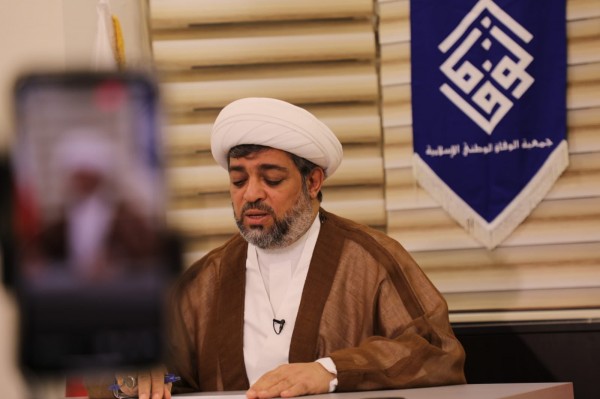Percentage of Participation in Sham Elections Didn't exceed 35%: Al-Wefaq Deputy S-G

2022-11-14 - 1:39 p
Bahrain Mirror: Sheikh Hussein Al-Daihi, deputy Secretary-General of Al-Wefaq National Islamic Society, the largest opposition group, pointed out that the participation rate in the elections did not exceed 35%, despite the official coercion and intimidation to force everyone to participate and the deletion of a large number of voters.
In a speech at the end of the legislative elections in Bahrain, which he described as sham, Sheikh Al-Daihi thanked the Bahraini people for their victory in exposing the falsity of the electoral process, despite threats and the various methods of intimidation practiced by the regime. The people of Bahrain proved once again that they are conscious, able to accurately diagnose, have a solid will and strong determination, and have passed the test with remarkable success.
Sheikh Al-Daihi said that those who followed the elections today notice the extent of reluctance to participate in the process of sham parliamentary elections, as it was noted that the boycott percentage in the youth category was very high.
Al-Wefaq deputy secretary general stressed that what happened today will produce a council that lacks legitimacy and real representation of the people of Bahrain, and the elections have gone by one component, the government component, as all political components were absent from the sham process. He said the elections were limited to the military, naturalized personnel, forced employees and some opportunists.
Al-Daihi pointed out that the society, through its teams of 118 observers, monitored from outside the electoral centers, and monitored the 55 local electoral centers. He announced that the participation rate did not exceed 35%, according to the figures calculated in all constituencies, despite official coercion, intimidation, and the deletion of a large number of voters..
He announced that the society recorded a large number of violations and notes on the electoral process, the first of which is the transfer of military personnel by allocated buses and coordination with them to come to certain polling stations. They were directly instructed to vote for certain candidates, noting that the military personnel make up more than 20% of the electoral bloc.
The society also monitored wide and targeted participation by naturalized people in a large number of districts to ensure the victory of certain candidates and to raise the voting percentage, while the percentage of naturalized people is estimated at more than 18% of the electoral bloc.
It was also noted that the Saudis, who hold the Bahraini citizenships, voted at the causeway, which connects Bahrain and Saudi Arabia, in very large numbers. There were serious violations, which occurred for the first time, the most prominent of which was not announcing the number of voters in the constituencies. The number of voters was not also given to the candidates, i.e. observers and candidates do not know the number of voters, which hints at the size of the electorate, in addition to the fact that some voters used expired passports to vote.
Sheik Hussein Al-Daihi called on the authorities to understand and learn a lesson, as the people of Bahrain are not naïve and won't fall for the authorities' games. He said that the people of Bahrain are living today under the weight of a suffocating political crisis and gross human rights violations, adding that they adhere to the need for a genuine political process that saves and shifts Bahrain from authoritarianism and dictatorship into a democratic system and social justice.
- 2024-07-10Bahraini Authorities Summon Head of Sanabis Ma'tam, Threaten "Actions" Due to Mourners' Chants Against Israeli Occupation
- 2024-07-10Political Prisoner Mohammad Al-Raml's Family Say He's Vomiting Blood Due to Poor Conditions, Fear for His Life
- 2024-07-09Ali Al-Majed Arrested After His Return to Bahrain
- 2024-07-08Yusuf Al-Muhafdha: Convicted Returnees to Bahrain Have the Right to a Lawyer, Retrial, and Legal Guarantees
- 2024-07-08Reciter Mahdi Sahwan: Head of Manama Police Informed Me of Ban on Reciters Traveling to Commemorate Ashura